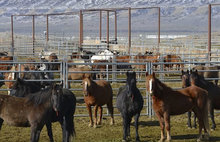After the American Wild Horse Campaign (AWHC) called on the Bureau of Land Management (BLM) to implement a public-private partnership to support the return of wild horses recently removed from the area near Boone Spring in northeastern Nevada, the BLM has reversed their decision to remove the horses, at least temporarily.

Wild horses in a BLM holding pen
This past week the BLM Elko District began the extreme measure of removing wild horses on an “emergency” basis near Boone Spring Nevada after the horses no longer had access to this life-sustaining water source due to a fencing project.
© 2017 by American Heritage Mustang Foundation
This past week the BLM Elko District, Wells Field Office, began the extreme measure of removing wild horses on an “emergency” basis near Boone Spring off Highway Alt 93 in Nevada.
The horses were living within the Antelope Herd Management Area (HMA). Despite knowing that the horses in this area historically relied upon the Boone Spring and that the horses no longer had access to this life-sustaining water source due to a fencing project, the BLM failed to take measures to ensure the horses had access to year-round water in the area.
AWHC urgently contacted the BLM to offer financial assistance to enable the agency and local residents to work together to return the horses to the range and prevent them from being sent to government holding pens where taxpayers will pay millions of dollars to house the horses for years.
AWHC has also offered to assist with financing and implementing a humane birth control program to humanely manage the horses on the range.
The Bureau of Land Management (BLM) Nevada’s Elko District, Wells Field Office has now temporarily halted the emergency wild horse gather that started May 8 to evaluate whether or not to continue.
“We’re going to take a one to two week break and observe the area to see if any horses appear to replace those we have gathered,” said Ben Noyes, BLM Nevada acting wild horse and burro program lead.
AWHC has asked BLM to return the captured horses to the range and work with AWHC and area residents to keep the horses in place.
“This is a great opportunity to follow the Trump Administration’s vision to come up with creative solutions and partner with the private sector to save taxpayer dollars,” said AWHC’s Deniz Bolbol.
“Failing to work with AWHC on this proposal would continue the ‘business as usual’ practices that the National Academy of Sciences said would be ‘expensive and unproductive for the BLM and the public it serves.”
Approximately six years ago the Nevada Department of Transportation (NDOT) fenced Alt 93 due to public safety issue. Since that time local residents, knowing the horses were no longer able to access their historic water source at Boone Spring, began to provide water to the horses.
Only after the horses were being removed did AWHC learn that a financial arrangement was possible to enable the continued watering of the horses. AWHC immediately contacted the BLM requesting the horses be returned to the range in order that AWHC, BLM and local residents could begin a partnership to provide water for the horses and to begin a humane birth control program for the horses.
The horses removed are several locally-cherished bands.
This week they were trucked to privately-owned holding pens, which are closed to the public except on one day per year, where they will disappear into BLM’s vast holding system for captured mustangs. Once at the holding facility the closely-bonded family bands will be separated and will never see each other again.
Complete removal of the 70 horses would cost American taxpayers more than $100,000 per year to care for the animals at government holding pens.
The American Wild Horse Campaign (AWHC)American Wild Horse Campaign (AWHC) (formerly known as the American Wild Horse Preservation Campaign) is dedicated to preserving the American wild horse in viable, free-roaming herds for generations to come, as part of our national heritage. Its grassroots mission is endorsed by a coalition of more than 60 horse advocacy, humane and public interest organizations.
